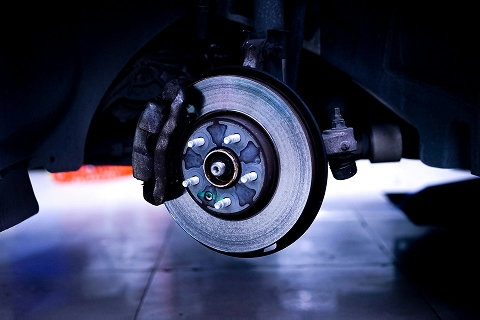How To Tell if Your Brakes Need Service
Brakes are one of the most important parts of a car when it comes to safety, but Orange County drivers often ignore small warning flags until they become big problems. Learning how to tell if your brakes need service can help you address issues before they pose a serious risk. It can also prevent further damage and more expensive repairs. In our 2025 guide, we break down the most common warning signs to look out for and when it's time to bring your vehicle in for a brake inspection.
Warning Signs Your Brakes Need Immediate Attention
Knowing what warning signs you should look out for can help you identify small brake issues before they escalate into much bigger (and more expensive) problems. Here's how to know if your brakes are going out so you can schedule service:
Unusual Sounds
One of the first signs you need your brakes serviced is unusual sounds. If you notice a high-pitched squeaking or squealing noise, it may indicate that your brake pads are wearing thin. While brake pad replacement intervals vary depending on driving habits, we typically recommend replacing brakes every 30,000 miles.
If your car is making a grinding noise, make sure to schedule brake service as soon as possible. This sound means the pads have already worn through and may be damaging the rotors. A clicking or rattling noise is even more serious. This usually points to loose or failing brake components that require immediate attention.
Pedal Feel and Performance
How your brake pedal feels is another indicator to pay close attention to. A spongy or soft pedal can mean that air has entered into your brake lines. If the pedal sinks to the floor, check your car brakes for signs of hydraulic failure. Low brake fluid can also be the culprit. A hard pedal that requires extra force to stop might signal booster issues. Orange County traffic can put extra strain on your brakes—especially during rush hour on the 405 or while navigating the steep grades around Laguna Niguel and Lake Forest. If you notice it's taking you longer to stop, give our service center in Mission Viejo a call immediately.
Physical Feedback
If your steering wheel or brake pedal vibrates when braking, it likely means the rotors are warped and need replacement. A car that pulls to one side could have uneven pad wear or a sticking caliper. If your car seems to jerk forward when you attempt to brake, have a professional take a closer look. These symptoms can point to several potential problems, ranging from uneven rotors to a malfunctioning anti-lock braking system (ABS).
Dashboard Warning Lights and Electronic Indicators
If you're still wondering how to tell if your brakes are going bad, take a look at your dashboard. A red brakes sign, usually depicted as a circle with an exclamation mark in the middle, can mean the brake fluid level is low or there's a hydraulic issue. It can also just be a reminder that your parking brake is engaged, so check this first. If the light stays on after you release the parking brake or illuminates while driving, treat it as an urgent issue.
Some cars may also display a message like "brake system service is required." An alert like this can indicate several problems, ranging from worn pads to a failing sensor. If a similar message appears, schedule a professional inspection right away. Another dashboard light to pay attention to is an amber-colored ABS sign, which refers to your anti-lock braking system. While your vehicle may still stop, your wheel-speed modulation might be offline, which can be dangerous on slick roads.
Some vehicles include a brake pad wear symbol that looks like a circle with dotted brackets. This light shows up when your brake pads are getting thin. Promptly replace them to avoid rotor damage.
When DIY Inspection Isn't Enough
You can see some brake issues, but sometimes it's best to have a pro check them. If you hear unusual noises that don't go away, see warning lights on your dashboard, or have continuous performance problems, your car probably needs more than a cursory check at home.
During a professional brake inspection, our certified technicians at Volvo Cars Mission Viejo will check:
- Brake pad thickness and rotor condition
- Calipers, sensors, and lines
- Brake fluid levels
- Clips, springs, and hardware components
- ABS system and electronics
Whether you're commuting from Aliso Viejo or dropping the kids off in Ladera Ranch, it's easy to stop by our Mission Viejo service center for a quick brake inspection.
Consequences of Ignoring Brake Warning Signs
Neglecting maintenance shortens your brakes' lifespan, which can lead to expensive repairs down the road. It's much more cost-effective to replace worn brake pads before they cut into your car's rotors. Ignoring early issues also puts you and your passengers at risk. Even a slight delay in your brake response time can mean the difference between avoiding a collision and causing one. Scheduling regular brake service is the best way to protect your passengers and keep your vehicle in pristine condition.
Book Your Next Brake Service at Volvo Cars Mission Viejo
Now that you know how to tell if your brakes need service, explore our monthly specials to see how much you can save when you bring your vehicle to Volvo Cars Mission Viejo. If you have any questions, send our service center a message, and one of our experienced technicians will be happy to offer their advice. Whether you're due for a brake pad replacement or noticed your car is making an odd noise, schedule your next brake inspection and service with us to make sure you're ready for the road ahead.
Image by ün LIU | Llicensed with the Unsplash License
